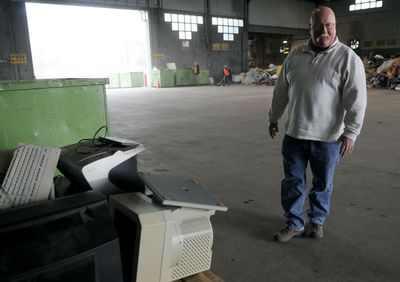PLUG IN TO RECYCLING
Kootenai County Solid Waste launches electronic waste program to prolong life of landfill

There’s a poster on Roger Saterfiel’s office door that summarizes the Kootenai County Solid Waste Department’s business philosophy: “Make the world beautiful for the rest of the universe. Reduce, reuse, recycle.” That’s the ongoing goal for Saterfiel, director of the Kootenai County Solid Waste Department.
To that end, a new electronic waste recycling program was recently launched at the Kootenai County transfer station on Ramsey Road. The program, started in late August, has the added purpose of reducing the amount of less-degradable garbage being sent to the county’s Fighting Creek Landfill, Saterfiel said.
“People can drop the electronics off here. Currently we are recycling computers, computer monitors, televisions, the larger items like that, and cell phones,” Saterfiel said. More than 50 tons of electronics have been recycled through the program since the department began keeping a record in the beginning of September.
About prolonging the life cycle of the landfill, which is estimated to remain in use until 2032, he added, “That may seem like a long time, but in our business that’s really not very long. So if we can extend that life that’s part of this, not only for environmental issues, but space-wise.”
All recycled electronic waste is trucked to the Old Town, Idaho-based United Recycling, Inc., a new business started by retired Bonner’s County sheriff’s deputy Phil Ciammaichella. Once at the 10-acre site, depending on the elements in each piece of electronic waste, it can be stripped into separate components, shredded into pieces, or shrink-wrapped so that the parts can be shipped to various recycling facilities in the U.S. and overseas. For example, the glass from microwaves is shipped to Vietnam to make certain kinds of plates and dishes.
Ciammaichella was inspired to create the business by watching what other people were throwing away and a desire to stay busy after retirement.
“I was just looking at how much stuff we were throwing away at the landfill one day. There was a lot of stuff that I thought there could be done something with instead of in the dump,” he said. With a host of vendors looking for electronic recyclables, he thought “I could make a living doing that,” he said. “It just makes sense to me to keep it out of our landfills and prolong our landfills.”
So far United Recycling’s clients include the solid waste departments in Kootenai, Bonner and Boundary counties, as well as some local businesses.
There are several reasons Kootenai County chose Ciammaichella’s business for the program, Saterfiel said.
“I’d say we spent about three months checking him out, if you will, to make sure that number one, he was not going to just end up with a huge pile on his property and never get rid of it; and number two, that it went to the proper places. And with Kootenai County Solid Waste Department that is a priority that all our recyclables go to a credible destination,” he said. Citing the rise in instances of lead-based paints being found in children’s toys, and a need to properly dispose of other toxins such as mercury and cadmium that are sometimes found in electronics, he added, “We made sure that he had proper outlets for these things so that we didn’t have these piles of electronics in another country coming from our country.”
In addition to United Recycling’s reputable recycling practices, cost played a pivotal role in working with an external source, Saterfiel said. United Recycling already had the necessary equipment in place, including a large baler that bundles the electronic material into squares, and a machine that shrink-wraps waste for transport. The only fee the solid waste department has to pay is $12 for each television. Everything else is free, Saterfiel said, since Ciammaichella can turn the component parts into a profit.
“We’re a fee-based organization,” the director said. Unlike solid waste departments in neighboring states such as Oregon and Washington, Kootenai County Solid Waste doesn’t receive subsidies to help pay for recycling programs. That’s one of the reasons the glass recycling program was eliminated earlier this year, Saterfiel said, adding that transportation costs are another primary factor. “I think glass someday will be a very useful product, but right now there are so many issues with it.”
That makes it a balancing act in figuring out which services to provide to the public, Saterfiel explained. “We really have to keep a close eye on balancing.”
And as the February deadline approaches when all television broadcasting switches from analog to digital channels, waste departments across the country are anticipating a huge spike in old sets. “That’s why we wanted to start this program early to see what we could expect on a regular basis; now we’ll be able to compare it when it goes digital,” Saterfiel said. “I expect it to increase a lot more.”
While the electronic recycling program is currently limited to certain items, starting in early January Kootenai County Solid Waste will accept electronics of any size. That means, Saterfiel said, “Anything that can be plugged into an outlet that’s electronic, we can recycle, from coffee makers to can openers.” Refrigerators – more than 5,000 are dropped off at the site every year – will be included.
The program’s growth is in part due to Ciammaichella’s expanding operation, Saterfiel said. “He is constantly looking for markets, and he has found a market for this stuff.”
Keep in mind, though, if an electronic item or gadget is in good working condition, it might be best to recycle through donations, Saterfiel said. There is a St. Vincent de Paul container on-site for the public.
“Everything that we have is recyclable if you think about it. There are very few things, like mercury and other hazardous material, that aren’t,” Saterfiel said. “You just got to get people to do it, and you have to make it convenient.”